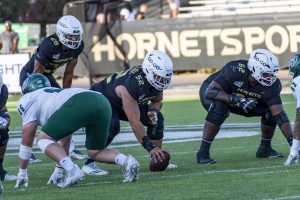University president addresses campus issues
March 9, 2006
Editor’s Note: This article has been edited from its original version.
Sacramento State President Alexander Gonzalez updated the campus community about the progress of Destination 2010 ?” an initiative focused on turning the university into a destination campus ?” student enrollment and the university’s budget Thursday.
At a town hall event held in the University Union’s Hinde Auditorium, Gonzalez said the university’s focus on the Destination 2010 initiative will continue to be academic excellence and student programs.
He explained how the university had to “get in front” of infrastructure needs because of the time that it takes to complete those projects.
“Unlike the huge IKEA building, which went up quickly, it takes years for us, a state agency, to build things,” Gonzalez said.
It also will take time to plot the new course for academic and student programs.
Fellow panelist at the event, Joseph Sheley, executive vice president of the president’s office, said “you don’t turn a ship this size in no time.”
Sheley added that Destination 2010 isn’t a strategic plan; it’s a mechanism to start conversation and provide focus.
The third participant in yesterday’s program, Ric Brown, provost for academic affairs, said faculty, students and administration would be included in this conversation through the recently created Strategic Planning Council.
“All need to be involved in determining where we are going and who we want to be,” Brown said.
Obviously, funding ?” 98 percent of Sac State’s comes from the state, according to Gonzalez ?” plays a large part in the direction that the university takes.
The method used to determine the level of funding, called full-time equivalency, was assailed by both Gonzalez and Sheley.
The number of students enrolled is divided by 15 units to arrive at the full-time equivalent figure.
Gonzalez called this a “regressive, accountant’s approach” because it measures quantity of production when quality matters.”
Sheley said that now is the time to begin deciding how to leave-behind the current funding system, or at least to determine how to re-package the system.
Gonzalez said he likes to hold town hall-style gatherings a few times each year in order to discuss all the things that cause students, faculty and staff “anxiety.”
Paul Edwards, the director of student athletic resources in the academic affairs department, said he considers it proactive and responsible of Gonzalez to conduct these outreach events.
“He has a lot of energy and he answers questions honestly,” Edwards said. “No question is off-limits.”
Ken Barnett, a staff member in the public safety department, called the program “well-rounded” and said it offered a “good perspective” to the strategic planning that’s occurring.
Although the focus of the initiative has turned to academics, the continuation of infrastructure improvements is still a large part of the overall plan.
Gonzalez said that the new parking structure will open early next spring and that construction of the Recreation and Wellness Center is slated to begin “very soon.”
Additionally, a science and space center, to be financed with private funds, is in the pipeline and replacing several antiquated buildings on campus.
Gonzalez also mentioned that Gov. Arnold Schwarzenegger and the Legislature have been discussing bonds that might go towards higher education.
Associate Vice President of Public Affairs Frank Whitlatch said these various types of bonds have no confirmed schedule on when it will show up on the ballot.
Norm Erickson can be reached at [email protected]
























































































































